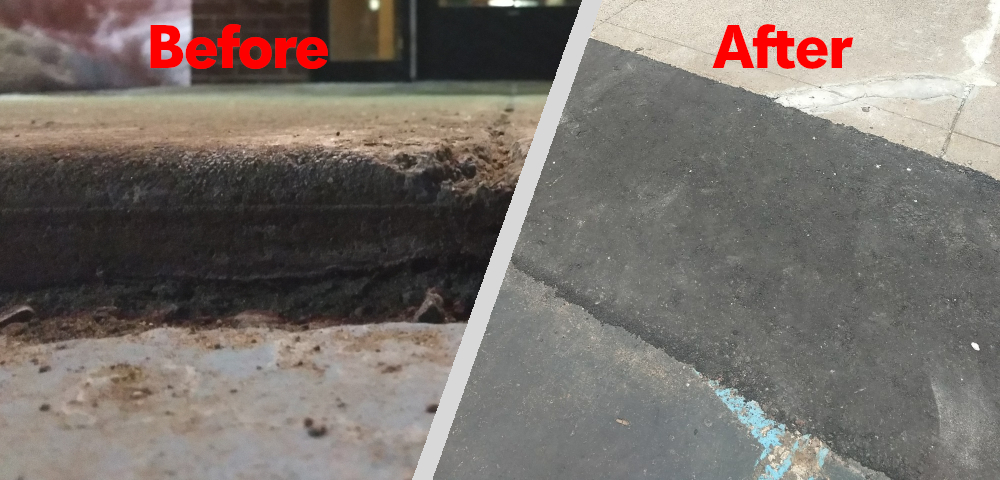We celebrate small wins for wheelchair accessibility with ALS
Older buildings are just some of the challenges we face in our community
Written by |

Since the point where my husband, Todd, needed a wheelchair because of his ALS progression, he’s had to navigate a less than perfectly accessible world.
Todd is particularly challenged in our old community, which was built up long before the passage of the Americans with Disabilities Act in 1990, with its accessibility requirements for public businesses. Accessible design elements have since been incorporated into the construction of buildings, but many of our businesses operate out of early 20th century buildings, which have been grandfathered into a perpetual state of inaccessibility, with steps to get inside or inadequate seating.
Todd is homebound now, but when he could get out, his activities were limited to the buildings he could access. He could attend school events for our kids because the schools were built after the ADA passed. But when our daughter once had a violin recital in the old two-story building where I’d attended elementary school, he could only listen from the front foyer because the structure was never retrofitted with an elevator.
Another time, our daughter was in play at a historic theater that had opened in 1900. The old auditorium’s aisles are too narrow and steep for a power wheelchair, but at some point a few seats in the back row were removed and a platform added. Todd had parked his chair there while I sat on a folding chair next to him. But when we returned for the play, a sound booth was in that spot, leaving Todd to park against the back wall. Fortunately, he has an elevate function on his wheelchair, so he could rise enough to see above the heads in front of us. I stood next to him.
We were delighted when there was a performance at a modern theater on our local university’s campus. There’s plenty of room for wheelchairs, with companion seats next to them.
Other kinds of challenges
Our local university also has accessible rink-side seating in its hockey arena, but when we started attending games, it was general admission. For one game, I purchased a wheelchair ticket for Todd and three companion seats for me and the kids. That hockey game was well attended because we were playing our rivals from a neighboring university, and other people in wheelchairs had filled all but one spot — and that was blocked by a videographer for a local television station. The man ignored our request to move his tripod down 3 feet, so I talked to someone in the box office. A manager arrived and persuaded the videographer to move over. The manager was apologetic and gave us free popcorn. The next time we attended a game, numbers had been added to the companion seats and open wheelchair spots so we could reserve the specific spaces.
It felt good to have a win.
Todd also had an accessibility win when he got a national chain restaurant to add a ramp between its parking lot and sidewalk. For years, Todd went out with his buddies every Thursday night, but it was difficult to get into the building because the asphalt parking area was a few inches below the sidewalk’s elevation. He couldn’t smoothly transition between the surfaces and would be jostled. But the real problem was leaving, when his chair would tip forward driving off the sidewalk. Todd had to back off of it for his safety.
He complained to the manager a few times over a couple years, and the manager assured him that he’d escalated the complaint, but no action was taken until Todd found a form on the corporate website and described the problem. They must have contacted the franchise owner, because a month later the problem was fixed.

Before and after the sidewalk was fixed. (Graphic by Todd Neva; photos courtesy of Kristin Neva)
It was an incremental improvement in a world that’s been progressively difficult for Todd to access.
Note: ALS News Today is strictly a news and information website about the disease. It does not provide medical advice, diagnosis, or treatment. This content is not intended to be a substitute for professional medical advice, diagnosis, or treatment. Always seek the advice of your physician or other qualified health provider with any questions you may have regarding a medical condition. Never disregard professional medical advice or delay in seeking it because of something you have read on this website. The opinions expressed in this column are not those of ALS News Today or its parent company, Bionews, and are intended to spark discussion about issues pertaining to ALS.







Leave a comment
Fill in the required fields to post. Your email address will not be published.